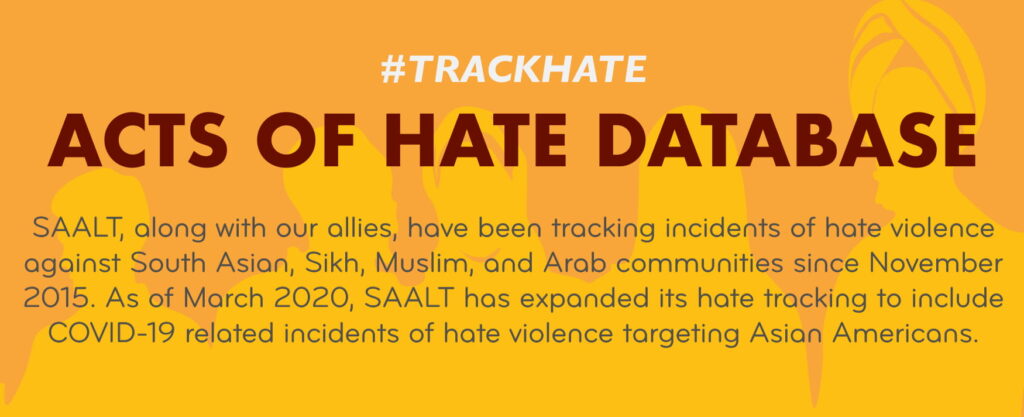
Since the COVID-19 pandemic hit, East Asian allies and those racialized as East Asian have experienced a spike in hate violence and discrimination. Our AAPI partners, OCA, National Council of Asian Pacific Americans, Chinese for Affirmative Action and Asian Pacific Planning and Policy Council, have links of reporting incidents on their websites, and we encourage folks to find the right space to report their experiences:
- The Asian Pacific Policy and Planning Council, A3PCON, has in-language hate incident reporting guides, including ones in Hindi and Punjabi. You can view them here.
- Chinese for Affirmative Action also has in-language hate incident reporting guides, available here in Punjabi, Thai, and more.
Like many other communities, South Asians have long experienced xenophobic rhetoric, bias, and violence. Many of those who first immigrated to the United States were subject to anti-immigrant rhetoric and driven out of towns where they settled. After 1965, South Asians increasingly experienced bias in the workplace, whether in pay inequity or social stigma for language abilitys. Soon after, larger communities of South Asian working class immigrants moved to urban areas, where they faced targeted alienation and violence; most of this violence was xenophobic in nature.
Since September 11th, however, South Asian, Muslim, Sikh, and South West Asians have become the targets of a more specifically xenophobic form of Islamophobia, resulting in numerous hate crimes, as well as employment discrimination, bullying, harassment, and profiling. In this same period, places of worship were increasingly vandalized and attacked, including the tragic shooting of the Sikh gurdwara in Oak Creek, Wisconsin and hate crimes against Muslim community members (and other community members racialized as Muslim) grew in numbers. Though this form of Islamophobic violence did not cease, its rate of increase slowed – until around 2015, when then-Presidential candidate, Donald J. Trump, used national platforms to promote Islamophobic, xenophobic, and racist rhetoric. As a direct result of this, SAALT, along with our allies, began tracking hate crimes against Muslims and those racialized as Muslim. This database was active from 2015 to 2021, and prioritized reporting that centered survivors’ and victims’ experiences with violence and harm. Starting in 2022, this database is shifting to better understand how survivors and victims of hate violence call for healing and justice for themselves, their loved ones, and their allies.
If you would like to report an incident, we ask that you reach out to our allies at Stop AAPI Hate or OCA at this link. At present, SAALT is available to assist community members with specific translation and legal requests, through our work with the South Asian Rapid Response Network. As a non-legal advocacy organization, SAALT is here to connect community members with allies who can provide specific resources.